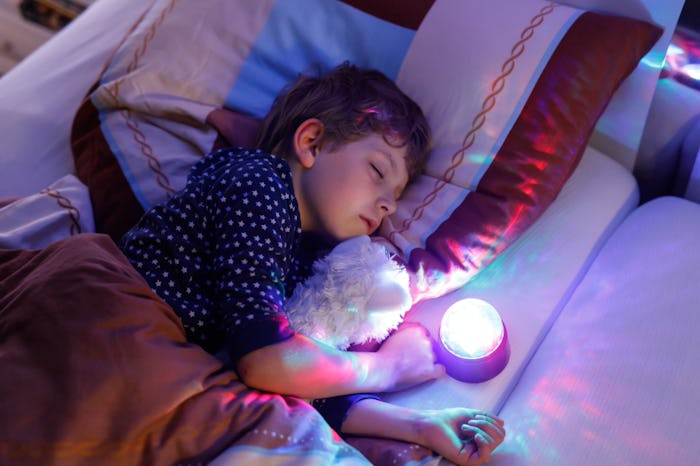Life

Kids Can Be Afraid Of The Dark Early, But Here's How To Help Them Feel Brave
Kids can develop some random irrational fears — the vacuum, thunder, monsters — but one fear that is universal and completely legitimate in my opinion is the dark. Even as an adult, I'm still scared to be wandering around in the dark by myself. But, why? When do kids become afraid of the dark, and most importantly, how can parents help them cope with this all-too-common fear?
Growing up, my brother and I used to play this game with our dad where he would hide in the back of our house with all the lights off. We'd wander back there looking for him and he would come out and scare us. It was basically hide-and-go-seek but in the dark, and it terrified me. Even now, I leave my bathroom light on at night so I'm not forced to roam the hallway in the pitch black — although, if anyone asks, I'd say it was so my 5-year-old can navigate his way to the bathroom at night and avoid an accident but, let's be honest, leaving the light on is for my benefit.
To understand what makes the dark so scary for kids (and some grownups), I checked in with retired professor of early childhood education and psychology Dr. Kim Metcalfe, author of the book Let's Build ExtraOrdinary Youth Together, and developmental therapist, parenting coach, and author of the website Parenting Expert to Mom, Kayla O'Neill to see how we can help our kids overcome the things that scare them most.
When it comes to developing a fear of the dark, Dr. Metcalfe says that the "fear of the dark may begin as early as age 2 and continue through the preschool years to age 5." I'm sure a lot of parents can relate to that. I know my son began to be fearful of the dark around his preschool years, so we got a dinosaur night light that changes colors and started keeping the bathroom light on — you know, for him — which helps.
When I asked why the dark is such a universal thing that children are afraid of, Dr. Metcalf says, "Typically, young children fear what they do not understand. Naturally, there can be a specific occurrence that suddenly makes kids frightened of the dark," meaning siblings or kids at school telling them scary stories about monsters under their bed at night or the like. O'Neill agrees that sometimes children can develop the fear after an experience the child has had, but adds that "sometimes children will develop a fear out of nowhere." Which can lead to parents getting blindsided at bedtime.
When my son started telling me about his fear of the dark, I took him with me to pick out a special night light. He picked out a dinosaur light that changes colors, and he enjoys picking which color he would like each night before bed. Bonus: the light really does add a nice quality to his room. Dr. Metcalfe explains that parents can check in with kids every few weeks to see if they're ready to forgo the night light, and they should offer patience instead of frustration when dealing with a child's fears. While the night light helped in our house, there are other things parents can do to make things a little easier at bedtime. "Do not insist that they sleep in the dark. Be patient. Be responsive to their needs. Ask questions, 'What frightens you? What can we do about that?' Obviously if the fear never subsides, or becomes chronic, seek professional help as something more serious may be occurring," Dr. Metcalfe says.
But sometimes kids have a hard time communicating their fears. "You could try to bring it up while reading a book that has characters that experience fears," O'Neill suggests. But bottom line? Being afraid of the dark is completely normal. Minimize the scary things before bedtime, show your little one patience, and invest in a new nightlight they're excited about. The nighttime scaries will soon be a thing of the past. (Until you grow up and get to keep your own bathroom light on.)